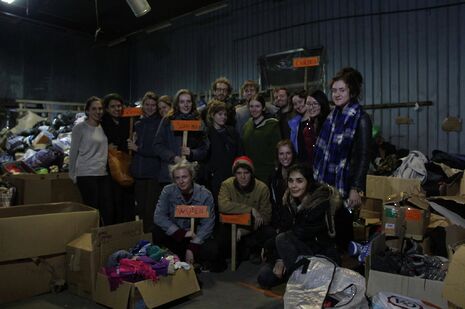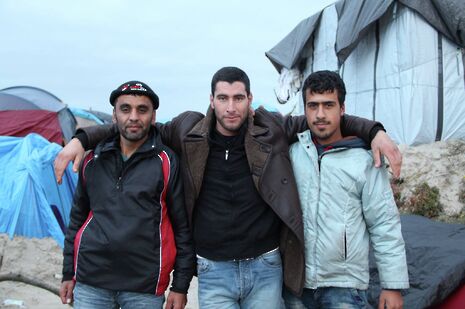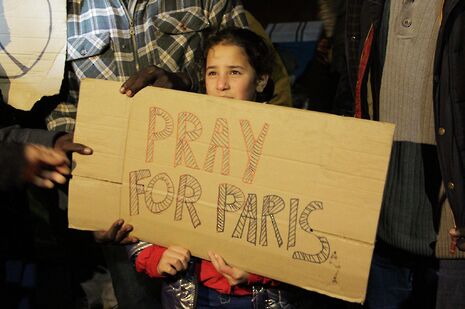CUCRAG in Calais
Cambridge University Calais Refugee Action Group made a two-day trip to Calais on 13th November to help with relief efforts

Thousands of dispossessed people from flashpoints in the Middle East and Africa are currently seeking refuge in Europe, and it’s only now that many of us in the UK are becoming aware of the scale of the crisis unfolding on our doorstep. It’s time to do something to help. Last weekend, the Cambridge University Calais Refugee Action Group (CUCRAG) organised a trip to Calais for 10 students keen to volunteer directly in the relief efforts.
Although a refugee camp has existed in the dunes east of Calais since 1999, over the past year more people have arrived than ever before. It’s estimated that in the last month the camps, now called the ‘the jungle’, have doubled in size. They now support a population of around 6,000, the vast majority of whom wish to seek asylum in the UK. While some aspects of the camp have an air of semi-permanence, with gravel roads wide enough to fit a car, makeshift shops and eateries, there are no services to speak of. Rubbish is collected occasionally, electricity is limited to the occasional generator, and only in the past few weeks has a French charity started regularly disposing of the camp’s faecal waste. The majority of people still live in small, frail tents of the kind used for camping holidays, though much effort is being made to change this. The French authorities appear to be contributing little towards the provision of the most basic services, and have allegedly disallowed fire engines and ambulances from entering the camps, deeming it a security risk to their personnel. By contrast, the Gendarmerie are found all around the perimeters and inside the camps, clad in body armour and often carrying teargas.

Working alongside the charity CalAid, the CUCRAG volunteers were involved in providing essential goods and services to people living in the Calais refugee camps on the inaugural trip. While CalAid and other charities have been receiving large numbers of donations – especially of clothing, food and hygiene products – there have simply not been enough people working to sort through the donations and get them out of warehouse storage and to the people who need them most. Everyone on the CUCRAG trip spent some time going through this vast backlog, separating the less practical items (high heels, a wedding dress, contact lenses) from things which were of immediate use for people living without adequate heating, cooking facilities, running water, or any means to stay clean and dry. There remains a dearth in some essential goods: shoes, small and extra small items of men’s clothing, oil and salt were just a few of the things that volunteers felt were badly needed. The group also took on a number of goods distributions, driving large quantities of things to the camps to be given away en masse. Three volunteers gave away approximately 150 coats in a single afternoon, making sure the queue did not get out of hand and that an efficient service was provided that benefitted as many people as possible. Overall, our group was involved in four such distributions, providing not only coats but toiletries, socks, hats, jackets, and t-shirts.
A number of volunteers remained in the warehouse, helping to construct shelters that might afford better protection than a tent in the cold, damp northern winter. Made of six major parts and easy to transport to the camps for assembly on site, the shelters are insulated and windowless, three metres wide by four metres long. Though very far from ideal, the shelters are capable of housing four or so people and are much cleaner, safer, and warmer than the tents that house most people in the camps. Over the course of the weekend, the volunteers were involved in constructing 10 shelters and assembling four on site.

From the refugee camps, it is possible to see both the neat and prosperous suburbs of Calais, and the white cliffs of Dover. The camp itself, however, is a place outside any legal or national frameworks, where people live in some of the most squalid conditions to be found in Europe, entirely reliant on the (sometimes haphazard) support of a few British and French charities and the continuing flow of donations from across Europe. Although the 10 CUCRAG volunteers could only spend two full days at the CalAid warehouse and in the camps, the work they did could make the difference between life and death for the thousands of people spending the winter months in dire poverty and political limbo on the shores of the English Channel.
Next trip this term: 27th-29th NovemberJoin our Facebook page here for updates: https://www.facebook.com/groups/1618633171690793/?fref=ts
 News / Fitz students face ‘massive invasion of privacy’ over messy rooms23 April 2024
News / Fitz students face ‘massive invasion of privacy’ over messy rooms23 April 2024 News / Cambridge University disables comments following Passover post backlash 24 April 2024
News / Cambridge University disables comments following Passover post backlash 24 April 2024 Comment / Gown vs town? Local investment plans must remember Cambridge is not just a university24 April 2024
Comment / Gown vs town? Local investment plans must remember Cambridge is not just a university24 April 2024 Interviews / Gender Agenda on building feminist solidarity in Cambridge24 April 2024
Interviews / Gender Agenda on building feminist solidarity in Cambridge24 April 2024 Comment / Does Lucy Cavendish need a billionaire bailout?22 April 2024
Comment / Does Lucy Cavendish need a billionaire bailout?22 April 2024





